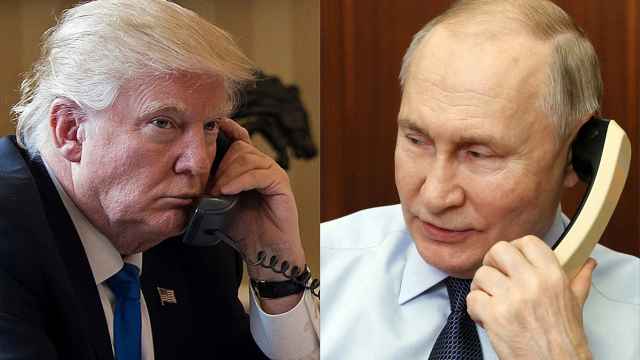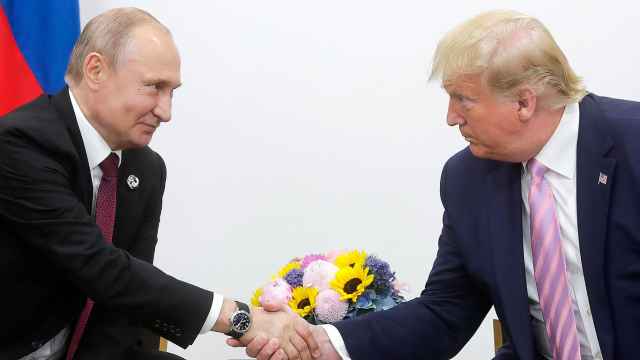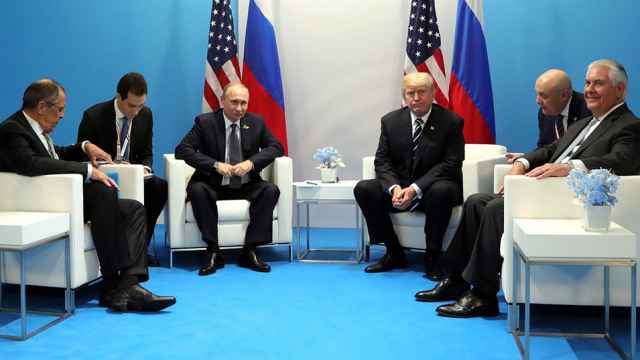President Trump is expected to hold a telephone conversation with Vladimir Putin today. The topic of the exchange is likely to be Syria. But the much anticipated first face-to-face between the leaders still has to happen.
Will they, or won’t they? According to Russian media, the Trump-Putin meeting was on the cards as early as January, immediately after the inauguration of the U.S. president. The meeting has since been confirmed — and denied — several times. Few now believe the two leaders will meet before the G20 summit in Italy in July.
Even when they do meet, Russia won't be ready. Here’s why:
One of the enduring myths in Russia is that Trump is very keen to meet Putin, but has so far been obstructed by hard-line ‘Russophobe’ members of his administration, the ever-vigilant Congress and the FBI investigation into Trump’s campaign ties to Russia.
All these factors are real. It’s just that we do not know for certain whether the U.S. president is really such a big fan of the Russian strongman as his campaign rhetoric suggested. Everything we have seen and heard from the White House until now points in a different direction.
Firstly, Trump is a foreign policy novice who prides himself on pragmatism and unsentimental business logic. For him, the fact that Russia aspires to match the United States in global affairs while at the same time having a GDP equivalent to that of the state of New York must have been quite a sobering discovery. Trump cares for economic might – and despises those who do not possess it.
Secondly, Trump’s much-feared isolationism is by no means equivalent to impotence. He won’t engage in state-building and doesn’t pay much attention to democracy and human rights. But he will not shy away from using military force either. He proved this by launching 59 ‘Tomahawk’ missiles against a Syrian airbase (and encountering none of a much promised Russian response.)
The launch sent shockwaves through the Kremlin corridors, as Moscow’s Syrian operation was exposed for what it is – a deeply flawed plan that could only succeed with the weak administration of Barack Obama.
Thirdly, Russian diplomacy doesn’t help itself by constantly vacillating between calls for a “constructive and interest-based relationship” and macho insults like Sergei Lavrov’s remark about the U.S. Secretary of State and “dancing with boys.”
Fourth, awkward attempts by Moscow to approach and influence Trump’s campaign team had logical consequences. As one American acquaintance — a veteran corporate lobbyist on Capitol Hill — told me recently, “any contact with Russians now is suspicious in the eyes of the U.S. special services." Washington players will keep away from Russia if they can help it.
Fifth, the national security and defense team surrounding Donald Trump is comprised of many people who are deeply suspicious of Putin’s motives, including generals Mattis and McMaster, as well as intelligence chiefs Kelly and Coates.
But it was the president himself who chose them. He could have picked others more instinctively allied to Russia — like the well-known Kremlin advocate and former George W. Bush administration member Thomas Graham or maverick congressman Dana Rohrabacher. He seems to be pretty much content with his choice. The only close confidante with sympathy and (allegedly) close ties to Russia was general Michael Flynn. He was unceremoniously dumped after just three weeks in office.
That President Trump has already met with the Prime Ministers of Japan, UK, Israel, the Federal Chancellor of Germany, the King of Jordan and Deputy Crown Prince of Saudi Arabia, the General Secretary of the Communist Party of China and the Secretary General of NATO. That he has not even hinted at a possible date for a meeting with President Putin is quite unusual.
It is difficult to buy into conspiratorial explanations that Trump’s administration had to issue a number of tough statements on Russia before preparing for a meeting with Putin. The truth is more simple: Russia is not a top priority for the White House.
And this is the worst insult for Moscow. Enmity — no problem, adulation — you are most welcome. There is nothing the Kremlin hates more than indifference.
With few notable past exceptions, like providing support for NATO operations in Afghanistan or joining the international sanctions regime against Iran, Russia’s power in world affairs was is based primarily on its “nuisance factor,” or an ability to disrupt others from acting.
The aim is always to force global actors (first and foremost the United States) to talk to Moscow and listen to its repetitive litany of grievances, starting with NATO enlargement and ending with perceived attempts at “wrestling” the post-Soviet space away from Russia. This policy is also a linchpin of the Russian regime’s domestic legitimacy. It is based on three main pillars: nostalgia for Soviet grandeur, conspiracy theories and anti-Americanism.
Starting with Bill Clinton, every U.S. administration played along — at least for a time. This gave the Kremlin justification for its claim of global importance and power. But Donald Trump’s first one hundred days provided little of this former attitude. Maybe it will be rekindled at some point in time and the former real estate developer will fall for the Russian charms. But this seems unlikely.
Russian officials always disliked talking about “values.” They prefer to deal with cynics like themselves who only care for “interests.” But as the old saying goes, “be careful what you wish for.”
With Donald Trump, Vladimir Putin may have wished upon himself one pragmatist too many.
A Message from The Moscow Times:
Dear readers,
We are facing unprecedented challenges. Russia's Prosecutor General's Office has designated The Moscow Times as an "undesirable" organization, criminalizing our work and putting our staff at risk of prosecution. This follows our earlier unjust labeling as a "foreign agent."
These actions are direct attempts to silence independent journalism in Russia. The authorities claim our work "discredits the decisions of the Russian leadership." We see things differently: we strive to provide accurate, unbiased reporting on Russia.
We, the journalists of The Moscow Times, refuse to be silenced. But to continue our work, we need your help.
Your support, no matter how small, makes a world of difference. If you can, please support us monthly starting from just $2. It's quick to set up, and every contribution makes a significant impact.
By supporting The Moscow Times, you're defending open, independent journalism in the face of repression. Thank you for standing with us.
Remind me later.






